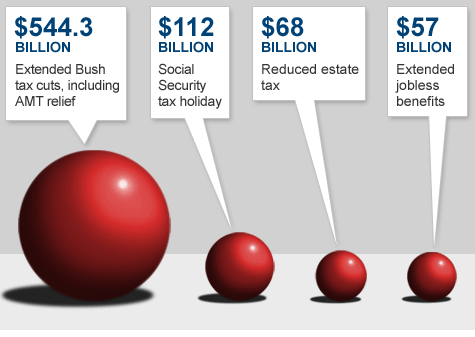Tax cut deal: How it affects you

NEW YORK (CNNMoney.com) -- Now that Congress has passed the Tax Hike Prevention Act of 2010, it will be sent to President Obama for his signature. And taxpayers will have some certainty about their tax situation, if only for the next 24 months.
The bill contains a bevy of tax breaks -- new and extended -- and emergency help for the jobless. Its cost over 10 years is estimated at $858 billion.
Here's a rundown of some of the biggest ticket items that will affect individuals. (Except where noted, all provisions are for 2011 and 2012).
Extended income tax rates: $207.5 billion The six federal income tax rates will remain at the same levels they are today: 10%, 15%, 25%, 28%, 33% and 35%. In addition, itemized deductions will continue to be allowed in full for high-income taxpayers.
AMT fix: $137 billion More than 20 million tax filers will be protected from having to pay the so-called "wealth tax," otherwise known as the Alternative Minimum Tax.
For tax year 2010, the bill will raise the amount of income that is exempt from the reach of the AMT to $47,450 for individuals and to $72,450 for couples filing jointly. In 2011, those exemption amounts will increase to $48,450 and $74,450 respectively.
In addition, the bill will allow taxpayers to apply nonrefundable credits (which reduce one's tax bill dollar for dollar) to their tax liability -- whether under the AMT or the regular tax code.
Social Security tax break: $112 billion Workers will get a 2 percentage-point break on their payroll tax for one year. Instead of paying 6.2% on wages up to $106,800, they will only have to pay 4.2% in 2011.
This tax break replaces the Making Work Pay credit, which expires this year.
Unlike Making Work Pay, which was limited to workers making less than $75,000 ($150,000 for couples), the payroll tax holiday will be available to everyone who pays into Social Security.
Expanded child tax credit: $90 billion The bill will retain the $1,000 child tax credit (up from $500 before the Bush tax cuts). It also will retain the reduced-earnings threshold, which allows more people to claim the credit as refundable.
A refundable tax credit is one paid to a tax filer even if the value of the credit exceeds his tax liability. So if a filer doesn't owe any federal income tax but qualifies for the credit, it is paid to him in the form of a refund.
Smaller estate tax: $68 billion Barring any changes, the estate tax in 2011 and 2012 will be reinstated at an exemption level of $1 million and a top rate of 55%. But under the bill, the exemption level will be raised to $5 million and the top rate lowered to 35%.
The legislation will also reinstate the so-called "step up in basis" for beneficiaries of those who die in 2010, 2011 or 2012. A stepped-up basis means that when someone sells an inherited asset, his capital gains tax bill will be based on the asset's price the day he inherited it, rather than when the decedent originally bought it.
Practically speaking that means the beneficiaries of those who died in 2010 will be allowed to choose which estate tax rules to follow -- those of 2011 or those of 2010. Under 2010 rules, there is no estate tax but also no step-up rules; there is only an option to exempt $1.3 million worth of capital gains from tax.
Help for the jobless: $57 billion The unemployed will get a 13-month extension of the deadline to file for additional unemployment benefits -- which go as high as 99 weeks in states hit hardest by job loss.
Extended investment tax rates: $53 billion Everybody will get to keep their low investment tax rates for the next two years. For most people, that means their qualified capital gains and dividends will continue to be taxed at 15%.
Low-income tax filers (those in the 10% and 15% brackets), however, will continue to enjoy a 0% tax rate on their capital gains or dividends.
Marriage penalty relief: $27 billion Marriage will still be hard (sorry), but not because less-than-wealthy two-earner couples will owe more to the IRS than they did when they were single.
The bill continues to ensure that the standard deduction for couples is exactly twice that for single filers. It also maintains an expanded 15% tax bracket so that the amount of income in that bracket for joint filers is exactly double that for single filers.
Expanded college credit: $18 billion Paying for college tuition in 2011 and 2012 will be made a bit easier with the retention of the American Opportunity tax credit, which is an expansion of the HOPE tax credit.
The Opportunity credit is worth up to $2,500 (up to 100% of the first $2,000 spent and up to 25% of the next $2,500), and it may be claimed for four years' worth of college. Eligibility to take the credit is limited to those with modified adjusted gross income below $90,000 ($180,000 for couples filing jointly).
Individual tax break extensions: Costs vary The legislation will extend a number of tax breaks that have been introduced in the past few years such as the option to deduct on one's federal return state and local sales tax instead of state and local income tax -- at a cost of $6 billion. Also, it will extend a deduction for qualified tuition and other education-related expenses at a cost of $1.2 billion.
SOURCE: http://money.cnn.com/2010/12/15/news/economy/tax_deal_what_is_in_bill/index.htm?hpt=T1